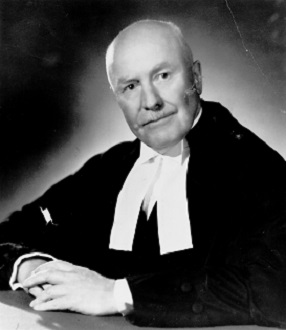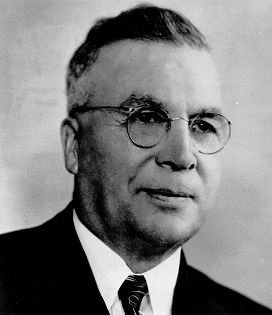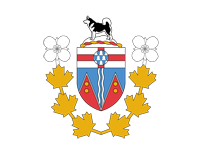Controllers 1936 to 1948
An increase in gold and silver production gave a moderate boost to Yukon’s economy. To reflect this, the title of the Chief Executive Officer of Yukon was changed from Comptroller to Controller.
 John Edward Gibben
John Edward Gibben

Acting Controller from September 20, 1947, to July 12, 1948 (appointed at the age of 53)
Commissioner July 13, 1948 to August 15, 1950
John Edward Gibben was born on June 19, 1894 in Middlesbrough, England. Gibben was a magistrate in Yukon before becoming Commissioner. He prepared detailed assessments of the budgets required to upgrade roads, schools and hospitals. This resulted in the first territorial/federal financial agreement to provide significant sums of money for the improvements. He resigned after he was appointed judge of the Territorial Court. Gibben died on January 28, 1958 in Whitehorse, Yukon and is buried in the Pioneer Cemetery on 6th Avenue.
In recognition of the territory’s growing stature, the Yukon Act is amended to reinstate the positions of Commissioner and Administrator on June 30, 1948.
 George Allan Jeckell
George Allan Jeckell

Comptroller from June 30, 1932 to December 2, 1936 (appointed at the age of 52)
Controller from December 3, 1936 to September 20, 1947 (title changed to reflect his greater responsibility over government operations in the territory.)
George Allan Jeckell was born on July 25, 1880 in Exeter, Ontario. Jeckell had been teaching in Dawson since 1902 and started the move into administration positions in 1919. Jeckell managed a meagre territorial budget during the depression and refused to allow the council to pass bills that would allow Yukoners to not behave fiscally responsibly as the country prepared for WWII. Controller Jeckell and his small staff managed territorial programs from Dawson City where three Yukon Council members met for a few days once a year to pass a budget and ordinances. Jeckell created special hunting rights for US soldiers working the highway in 1942. In April 1946, Jeckell took part in a dinner for 200 people for the handing over of the Canadian highway section of the Alaska Highway and facilities to the Canadian government. During his time in the position, there were big construction projects such as the Canol Project, the Refinery in Whitehorse, the Pipeline to Skagway and the Alaska Highway. Upon his retirement, he received the Order of the British Empire in recognition of his long career in Yukon. Jeckell died on May 30, 1950 in Seattle, Washington.
An Order-in-Council transfers the power of the Gold Commissioner to the Office of the Comptroller on June 30, 1932. The Office of the Commissioner is officially abolished on February 20, 1934 because of worsening economic climate.
A considerable reorganization of the federal government took place and an Order-in-Council changes the title of the Yukon Chief Executive Officer from Comptroller to Controller on December 3, 1936.
